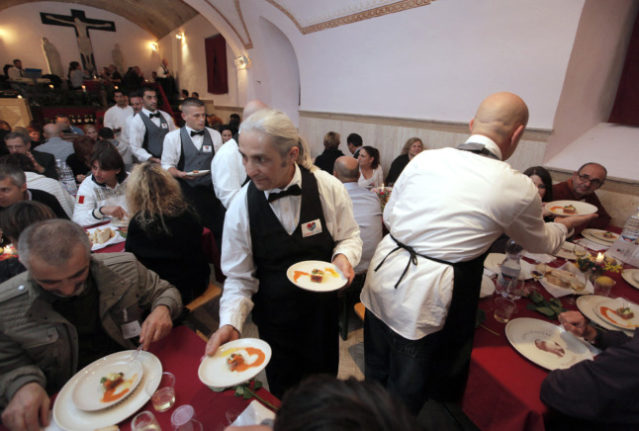
Photo by FABIO MUZZI / AFP Extracted from thelocal.it
Tipping etiquette in Italy: what are the rules?
Restaurants
Let’s start with the fundamentals: you may not stay in fancy hotels or travel by taxi in Italy, but you are probably going to eat at a restaurant at some point, and don’t want to be worrying about how much extra to set aside for the bill.
Here, you can relax: tipping big isn’t required or expected in Italy.
That’s partly because Italian waitstaff aren’t reliant on tips to get by like they are in other parts of the world; and partly because in some restaurants, it’s already included in the bill.
If you see "servizio" listed as one of the items on your "conto" (bill), service has been covered. It will usually be no more than a couple of euros per diner.
At most sit-down establishments, you can expect to see a "coperto" (‘cover’) charge of anywhere between €1 to €2.50 per person to cover basics like bread and olive brought at the start of the meal. You might also see this cost identified as "pane".
This second type of charge goes to the restaurant rather than the server, so it doesn’t constitute a tip.
If you don’t see "servizio" listed on the bill – or even if you do – you might want to leave a small tip in the form of one or two extra euros per person, and if there’s a group of you paying the bill together, you’d want to round up to at least the nearest five.
But there’s no need to pay 20 or even 10 percent extra.
If you’re paying by card, bear in mind that very few places will be able to add a tip to the card payment – so you might want to carry some change or small notes so you are able to leave something behind.
Bars
You generally wouldn’t be expected to leave any tip when visiting a bar in the evening in Italy.
That’s perhaps partly because the majority of Italian bars double up as cafes or coffee bars, so you can go there for your cappuccino in the morning, an espresso and amaro after lunch, and a spritz in the evening.
The more relaxed quality to these types of bars, and their dual identity as cafes, means there’s not the same bar tipping culture that you’d find in some other countries.
However if you’re at an upscale wine bar and get snacks or sharing plates, then you might consider leaving a little something extra, as you would at a restaurant.
As for tipping for your coffee; there’s no obligation at all, but it’s common to round up by a few centesimi if it makes sense. For example, if you’re paying 90 cents for an espresso, it’s normal to just leave a euro coin on the counter and walk away.
Many cafes these days also have tip jars on the bar where you can deposit your loose change.
Bear in mind that most cafes will charge you more to drink your coffee sitting at a table than standing up at a bar.
The price lists up by the counter usually refer to the cost of a standing drink, and only some of them also include the sit-down price, so if you’re in a touristy area, it’s worth checking the cost of table service before sitting yourself down.
Taxis
No tipping is required or expected. Your driver will give you exact change and expect you to keep it – though if you hand them a note that’s a little higher than the amount on the meter and tell them to keep the change, they probably won’t say no.
Though people generally pay by cash, most Italian taxis should also have card machines you can use if you prefer.
Car park attendants and supermarket helpers
It is the norm to give a small tip to people who bag your shopping or help you park/keep an eye on your car. Anything from 50c to €1 is generally what is expected.
It is the norm to give a small tip to people who bag your shopping or help you park/keep an eye on your car. Anything from 50c to €1 is generally what is expected.
Hotels
For smaller places like B&Bs and guesthouses, there are no expectations of any tip.
For more upscale hotels, you can use the same rule of thumb as applies to restaurants: one or two euros a day as a sign of appreciation to a housekeeper or dedicated waiter who’s taken care of you over the course of your stay. For porters who carry your bags for you, one euro per bag is the norm.